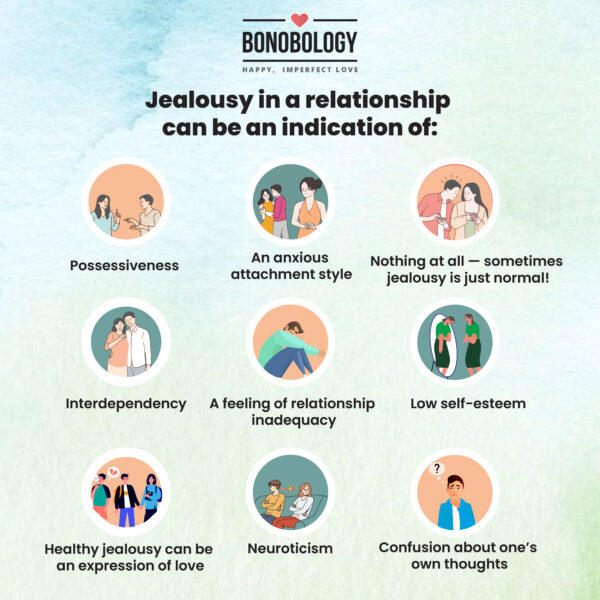Is jealousy a sign of love? Does it just signify trust issues? Can it just be pinned down to one cause, or is there a whole host of things you’re now going to need to read up on? Getting to the bottom of jealousy isn’t really going to require you to do too much digging. Especially since we’ve brought along counseling psychologist Shazia Saleem (Masters in Psychology), who specializes in separation and divorce counseling, to help tell us all there is to know about this necessary evil.
9 Things That Are Really Going On Behind Jealousy
That this emotion is complex, is stating it mildly. On the one hand, we’re all pretty well aware of the fact that it’s a universal emotion and all of us have felt it at one point or the other. Countless works of poetry and theatre have been inspired by the emotion. God has literally described himself as a “jealous God”, and your dog gets jealous when you pet another dog in front of him. But on the other hand, it’s an emotion that’s looked down upon. In some cases, where being jealous and insecure signify deeper problems within the relationship or in a person’s thinking, there may well be some cause for concern. So, how exactly do we navigate something that’s pretty normal but also makes you look insecure the minute you admit you’re feeling it? What is jealousy a sign of, and is there such a thing as normal jealousy in a relationship? It’s not an easy nut to crack and finding out what jealousy in a relationship is most often an indicator of may well just be subjective to each dynamic. Let’s try to uncover the reason behind the crassly asked, “Where have you been? Are you ignoring me?”, by your partner when you went out for a couple of hours.
1. What is jealousy a sign of? Of course, possessiveness
Alright, let’s get this one out of the way first. The cause of jealousy differs from person to person and possessiveness may well be the reason behind it in some situations. Shazia explains how the most common interpretation of being jealous and insecure can actually be at the heart of it all. “Many times, people have their own inner threats and fears that may lead them to believe that if they don’t protect their partner, they’re going to be left in the dust. “Since it’s hard to understand what your jealous feelings are telling you, they try to control their external environment and that often results in a person being protective or over-possessive. At the end of the day, it all revolves around unresolved emotional turbulence in a person’s mind or thought pattern.”
2. Jealousy in a relationship is most often an indication of an anxious attachment style
The theory of attachment styles tells us how a person behaves in a relationship and why they do so, and one such style is “anxious-ambivalent,” which is usually caused by the relationship a person has/has had with their primary caregiver. Didn’t think we’d take it all the way back to your childhood, did you? The truth of the matter is that the people who develop this attachment style usually tend to have had an ambivalent parent, who may not have been too confident in their role. They may have been available at some times and absent at others. As a result, the person grows clingy, needy and anxious about the health of any future romantic relationships they are involved in. In some cases, people can develop this attachment style regardless of their childhood.
3. Is there such a thing as normal jealousy in a relationship? You bet
“Jealousy is a normal emotion,” says Shazia, adding, “For generations now, we’ve been told to suppress any emotions that signal insecurity. We don’t know how to express ourselves in an acceptable or appropriate manner. “So, when people start to manifest their jealousy in weird ways, that’s when jealousy is often looked down upon as a negative thing. If the jealousy is handled well, well communicated and dealt with positively, you’ll realize it’s not something that always spells doom for your dynamic.” The consensus is that jealousy in a relationship is most often an indication of something negative. Instead of dismissing your partner outright, try to figure out what’s causing such an emotion before making your partner feel bad for it.
4. It can often signal interdependency in a relationship
According to studies, feelings of anticipated jealousy are heavily experienced in couples who are emotionally dependent on each other. Sure, spending all your time indoors, locked away in a room with each other may seem like an idyllic situation, but after a while, the lack of personal space in your relationship is bound to make your trips to the washroom twice as long as they used to be. Interdependency may signal stunted personal growth, trust issues, and communication barriers. Is jealousy a sign of love when the person you love can’t let you out of their sight for a couple of hours? That sounds more like Guantanamo than love, if you ask us.
5. It can be because of relationship inadequacy
What does jealousy feel like? It can often feel like a hyper-threatened state of mind that’s telling you the bond you have with your partner is always at risk, because everyone they talk to might coax them away from you. And why does a person think that way? Simply because they think they’re not good enough for their partner. According to studies, feeling like you’re not good enough for your partner, thinking they’re a lot better than you and thinking that the people they talk to are better people than you, can cause major jealous feelings. Hence, it’s important to try and figure out what your jealous feelings are telling you. The sooner you realize that it’s because you think you’re inferior, the sooner you can work on yourself. Plus, your partner reassuring you with all the things they like about you can act as a much-needed confidence boost.
6. Being jealous and insecure points to a low-self esteem
We don’t really need studies to point out that jealousy in a relationship is most often an indication of low self-esteem in your partner. Feelings of inadequacy almost always feature low self-esteem, which may often be annoying for a partner who fails to see why their jealous paramour can’t think more highly of themselves. “A person who is insecure feels inferior and incomplete with themselves. They don’t really know why these feelings arise, and they’re not able to behave in appropriate ways when these feelings come their way,” says Shaiza. “The biggest factor that drives insecurity-ridden jealousy is that these people try to control the external factors they should morally have no control over, like who their partner talks to,” she adds.
7. It can be linked to a person’s neuroticism
Oh great, more psychology lessons. Don’t worry, it’s not too hard to wrap your head around. It’s basically a fancy way of saying that a person’s anxious and self-doubting personality leads them to always develop jealous feelings in romantic relationships. According to studies, individuals with neurotic personality dimension (which, by the way, is a part of the big five personality types), tend to have higher feelings of jealousy. Since these people often struggle with anxious or depressive episodes, seeking the help of a counselor can be extremely helpful.
8. Healthy jealousy exists too
“If someone is trying to flirt with your partner and your partner is giving them more attention than you’d like, it’s obvious you’re going to feel jealous. Perhaps your partner has suddenly gotten very close to another person and they’re sharing more secrets with them than you,” Shazia tells us. So, is healthy jealousy a sign of love after all? In some particular cases where it isn’t extreme enough to be debilitating and is a result of feeling unwanted by your partner, it may well be a sign of love. Jealous love, but love nonetheless.
9. Sometimes, it can just be an indication of confusion
“Jealousy happens because a person is basically not emotionally aware,” says Shazia, adding, “It’s a very complex emotion. Most times, it signals the fact that people are not able to understand their own feelings or thought patterns. Being jealous and insecure in a relationship can be due to a whole host of reasons or may be due to situational factors as well.” In such cases, perhaps the best thing to do is to seek the help of a professional therapist who can help a person work through such emotions. If it’s help you’re looking for, know that Bonobology’s panel of experienced therapists are just a click away. Now that you know what jealousy in a relationship is most often an indication of, hopefully, you can get one step closer to fixing any negative emotions that may be causing it. There’s nothing a bit of healthy, judgment-free communication can’t solve. And while you’re at it, try a bunch of hugs too. They always seem to work.


